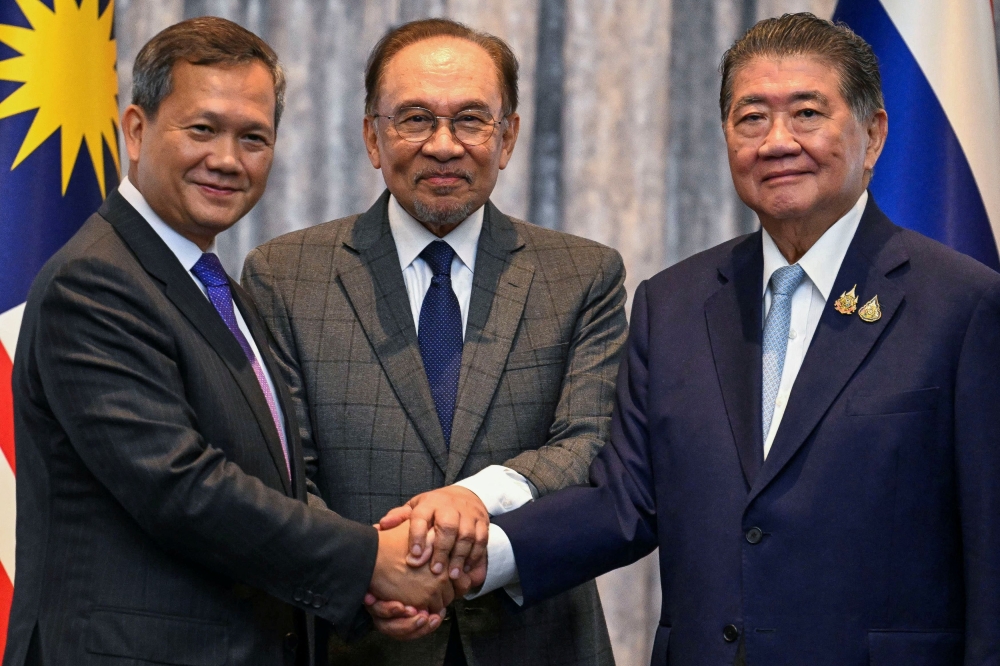AUG 5 — Amid a shifting and uncertain global order, Malaysia’s Prime Minister Anwar Ibrahim has achieved what few regional leaders have managed: gaining the respect of both China and the United States while elevating Asean diplomacy from ceremonial declarations to substantive peacebuilding. In hosting the historic Cambodian-Thai military talks in Kuala Lumpur, Anwar has not only asserted Malaysia’s credibility as Asean Chair, but also demonstrated that principled neutrality, when anchored in regional responsibility, can earn international trust.
The ongoing negotiations at the Malaysian Ministry of Defence between the military leaderships of Cambodia and Thailand mark the first time that defence officials from both sides have come together under third-party auspices to address their tense border dispute. These talks are no mere photo opportunity. Overseen by Malaysian Army Chief General Mohammad Nizam Jaafar, they are deeply technical and intentionally discreet, focusing on contentious flashpoints and the mechanics of sustaining the ceasefire agreed just days earlier.
With military attachés on standby to monitor implementation and a parallel Asean-led mechanism under development, Malaysia is doing more than hosting; it is actively shaping the architecture of regional security. By convening these talks ahead of Thursday’s General Border Committee (GBC) meeting — comprised of 54 senior representatives including Defence Ministers and Army Chiefs — Malaysia has created the preconditions for concrete deliverables. That this process is happening without fanfare, and yet with full awareness and tacit support from Beijing and Washington, is no accident.

Cambodia’s Prime Minister Hun Manet, Malaysia’s Prime Minister Datuk Seri Anwar Ibrahim and Thailand’s acting Prime Minister Phumtham Wechayachai shake hands as they pose for photos following a press conference, on the day of mediation talks on the Thailand-Cambodia border conflict, in Putrajaya July 28, 2025. — Reuters pic
Both great powers — China and the United States — have vested interests in a stable Asean . For China, the Thai-Cambodian border serves as a critical corridor into mainland Southeast Asia and Indochina. For the U.S., stability in this region reduces the risk of further militarization and offsets the spread of spoilers aligned with anti-democratic impulses. By playing the honest broker and avoiding overt alignment with either camp, Malaysia under Anwar has demonstrated that Asean need not be a pawn in great power politics — it can be a partner.
Malaysia’s role here is fundamentally Asean in spirit but global in consequence. This is the type of conflict resolution that aligns with the original intent of the Treaty of Amity and Cooperation (TAC): non-violence, peaceful dialogue, and regional solutions to regional problems. Yet too often, TAC principles have remained aspirational. Anwar’s facilitation of these military-to-military talks has moved them squarely into the realm of action.
What sets this initiative apart is its firm foundation in confidence-building measures, not coercive diplomacy. No guns are drawn, no ultimatums issued — just serious, high-level engagements that involve both civilian and military chains of command. That this is happening in Kuala Lumpur — not Bangkok, Phnom Penh, Beijing, or Washington — speaks volumes about Malaysia’s growing strategic capital.
The regional silence that greeted the initial outbreak of violence between Thailand and Cambodia only underscored the urgency for credible intervention. With over 300,000 displaced and military tensions simmering since late July, there was a real risk that Asean ’s credibility could collapse under the weight of its own indecision. That collapse has now been averted, thanks to Malaysia’s resolve and the maturity of the Anwar administration’s foreign policy apparatus.
This moment is not just a win for Malaysia — it is a defining test for Asean ’s evolution. If the current talks result in verified ceasefire compliance and long-term deconfliction measures, it would mark a milestone in Asean ‘s ability to contain bilateral disputes before they metastasize into regional crises. The long-criticized “Asean Way” is being refined in real time: quiet, deliberate, but no longer impotent.
For Malaysia, this is also a return to its long-standing tradition of behind-the-scenes diplomacy — from the days of Tun Hussein Onn’s neutrality to Tun Razak’s outreach to China. But under Anwar, there is a sharpened edge: the willingness to assume responsibility, invite the aggrieved parties to the table, and assume verification roles typically eschewed by Asean states. This is not just diplomacy — it is leadership.
And the world is watching. From Beijing’s calibrated approval to Washington’s quiet endorsement, Malaysia’s credibility is being affirmed. In an era where most peace efforts collapse under the weight of mistrust or great power rivalry, Malaysia’s achievement offers a rare and valuable alternative: that a mid-sized Muslim-majority state in Southeast Asia, led by a Prime Minister with intellectual depth and moral clarity, can broker peace without playing patron or pawn.
Anwar Ibrahim has elevated not only Malaysia’s stature but also the potential of Asean as a regional peacemaker. In so doing, he has redefined the standards of statecraft in Southeast Asia — with the endorsement, if not the applause, of the world’s most powerful capitals.
* Phar Kim Beng PhD is Professor of Asean Studies, International Islamic University of Malaysia and Director of Institute of Internationalisation and Asean Studies (IINTAS).
** This is the personal opinion of the writer or publication and does not necessarily represent the views of Malay Mail.






